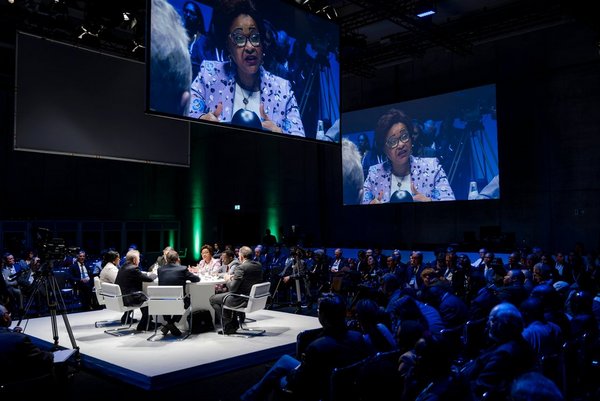- Share this article
- Subscribe to our newsletter
GFFA- Panel: Promoting agri-food trade between Africa and the EU
What significance do international trade in agriculture and an integrated trade system have in global food security, and can trade in agriculture and food contribute to achieving SDG2? Development Goal 2 formulated by the United Nations stipulates that hunger has to be eliminated and food security and better nutrition needs to be achieved by 2030, and that sustainable agriculture must be promoted. This was the context of the European Union’s High Level Panel held in the context of the Global Forum for Food and Agriculture (GFFA) by the EU Commission in mid-January 2020. Trade in agriculture and food with African countries and, in particular, inner-African trade were at the forefront of discussions.
In the Malabo Declaration of the African Union (AU) of June 2014, the African countries committed to increasing inner-African trade threefold by 2025. Furthermore, the creation of an African domestic market through the introduction of a free trade zone is planned for 2020. The 55 countries of the AU are divided into five regions; in future, each individual region’s comparative advantage is to play a greater role in trade.
The role of inner-African trade
“We wouldn’t be able to survive without inner-African trade,” stressed Namibia’s Deputy Minister of Agriculture Anna Shiweda. This country, which has the poorest levels of precipitation south of the Sahara, is attempting to economise on water. Its most important agricultural product is beef, which is exported to the EU and has recently started to be shipped to China and Hong Kong as well as the USA. “We can’t produce big amounts; we have opted for quality in order for our producers to achieve high prices,” Shiweda noted, explaining her country’s trade strategy.
The vicious circle that many farmers in developing countries are trapped in was highlighted by the African Union’s Commissioner for Rural Economy and Agriculture, Josefa Sacko. International markets demand quality. And the world market determines the prices of the products traded. “Whoever seeks to produce quality has to invest. But our farmers are unable to do that as long as the prices they attain for their products are too low and investments do not pay themselves off,” criticised Sacko.
Ethiopia’s Minister of Agriculture Oumer Hussien Oba also has mixed feelings about international trade. Ethiopia is the most important coffee producer on the continent. Fifteen per cent of production goes into exports, where premium prices can be fetched. In other branches, such as horticulture, things were not that promising, Oba explained. Here, the majority of the EU’s high demands in areas ranging from production to marketing could not be met yet. “We don’t want the EU to lower its standards but to train us so that we can comply with minimum quality standards,” Oba stated, addressing EU Commissioner for Agriculture Janusz Wojciechowski.
“The door is open to African products”
“Our farmers say that trade is good, but that it has to take place at eye-level,” Wojciechowski stated, explaining the EU’s position. Uniform standards were important, not only for consumer protection but also for environmental and climate protection. “I believe that we are working together with Africa in a very constructive manner in order to ensure that the countries are more able to meet our standards,” Wojciechowski noted. “Our door is open to products from Africa.”
This was also confirmed by Johann Swinnen, Director General of the International Food Policy Research Institute (IFPRI). Exports from Africa to the EU had risen over the past few years. While many studies had demonstrated that food standards could also constitute trade obstacles, they also promoted trade, as the example of Namibia had shown.
Nevertheless, so far, the continent had been exporting only few processed products. In the case of chocolate, for example, Africa was exporting the cocoa beans, which were then processed in other countries and reimported as chocolate, Swinnen explained, adding that integration in the world markets could be significantly enhanced through diversification.
The participants in the event agreed that it was high time to no longer regard Africa as a pure commodities supplier, but to also grant African trade partners fair access for finished products to the EU. So far, these processed food products had often met with tariff barriers.
Towards the end of the discussion round, the African panellists demanded that Europe contribute more to also allow informal market participants to participate in the value chain under fair conditions, e.g. through training programmes in the context of development cooperation. For most farmers in the countries of Africa were still working in the informal sector, AU Commissar Josefa Sacko emphasised.
Authors: Silvia Richter and Angelika Wilcke, Rural 21, Berlin and Frankfurt/Main
Further reading:
Rural 21 issue 04/2016: Trade and development I: Clearing obstacles, promoting inclusion
Rural 21 issue 01/2017: Trade and development II – The global dimension





Add a comment
Be the First to Comment